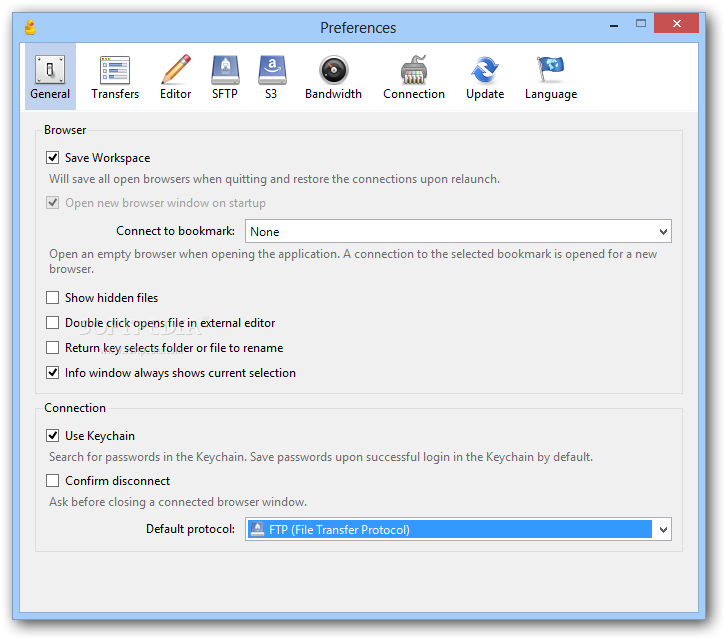

- #Cyberduck cannot read container configuration verification#
- #Cyberduck cannot read container configuration password#
- #Cyberduck cannot read container configuration windows#
If configuring the server is not an option, users should switch back to plain FTP connections. You need to have the option set TLSOptions NoSessionReuseRequired for FTP-TLS connections (Issue #5087). Possibly these are extensions to the standard FTP protocol your server may support you can invoke with the SITE prefix. Use Go → Send Command… to open a command input window for the current browser.Ĭonnected to a FTP server this allows to send arbitrary command not available through the user interface of the browser. You can enable custom origin Amazon CloudFront (Content Delivery Network) distribution using File → Info → Distribution (CDN). To remember your choice, select Always Trust…. You can temporarily or permanently allow to connect nevertheless by choosing Continue. The certificate is self signed or signed by a root authority not trusted in the system. You will get the error message You might be connecting to a server that is pretending to be….
#Cyberduck cannot read container configuration verification#
This failure during certificate trust verification is most often the case when the certificate is invalid eitherīecause the hostname does not match the common name in the certificate. If the certificate is not trusted by the system, you are asked to make an exception if you still want to connect to the site that cannot be verified. You can always switch back to FTP without TLS transport security by changing the protocol selection in the bookmark to FTP (File Transfer Protocol). If you attempt to connect to a server using FTP without TLS transport security but the server advertises support for TLS (as a response to FEAT), a prompt is displayed to secure the connection.
#Cyberduck cannot read container configuration windows#
Matching certificates are searched for in the Keychain on macOS or the Windows Certificate Manager respectively. When a server requests a client certificate for authentication, a prompt is displayed to choose a certificate with a private key that matches the given issuer name requested from the server. Mutual (two-way) TLS with a client certificate for authentication is supported. TLSv1 and TLSv1.1 are no longer supported as of FTPS should not be confused with the SSH File Transfer Protocol (SFTP). Implicit FTPS with no negotiation is deprecated and not supported. TLS Connections (FTPS) įTP with explicit TLS is supported. The setting is also available per bookmark. To change the character encoding for the current browser, use View → Text Encoding. If special characters such as Umlaute aren’t displayed correctly in the browser, try to change the character encoding used. The character encoding used to parse directory listings can be set as a per bookmark setting. The default setting can be set in the System Preferences in Network → Advanced… → Proxies → Use Passive FTP Mode (PASV). All connection profiles are available through the Preferences → Profiles tab.Ĭhoose between an Active (PORT) or Passive (PASV) connect mode per bookmark or when opening a new connection. When connecting with OpenStack Swift you can set the tenant name ( OpenStack Identity Service, Keystone 2.0) or project ( OpenStack Identity Service, Keystone 3.0) with -username. When connecting with SFTP you can give a file path to a private key with -identity for use with public key authentication.
#Cyberduck cannot read container configuration password#
You can give the password with the -password option or you will be prompted before the connection is opened by the program if no password matching the host is found in your login keychain (OS X) or user configuration shared with Cyberduck (Windows). You can pass username as part of the URI prepending to the hostname with Alternatively, use the -username option. Throttle bandwidth to the number of bytes per second. nokeychain ĭo not save passwords in login keychain (macOS), credentials manager (Windows), or plain text password file (Linux). Print protocol transcript for requests and responses. Useful on connnection timeout or latency issues. Retry requests with I/O failures once per default. %20 for space) as long as the path is quoted duck -upload "scheme://hostname/path with/spaces" "/Path/To/Local/File With/Spaces".ĭuck - username - list s3 : // Generic Options -retry Spaces and other special-characters are not required to be percent-encoded (e.g.


 0 kommentar(er)
0 kommentar(er)
